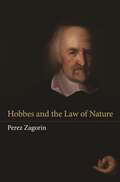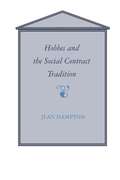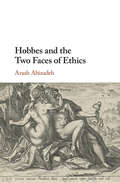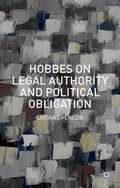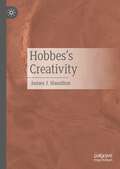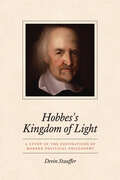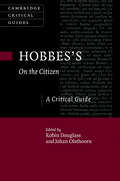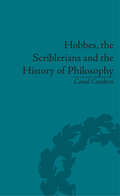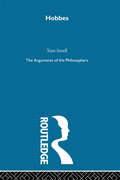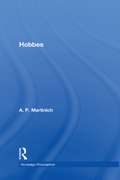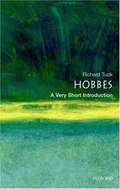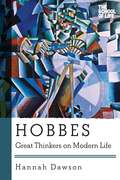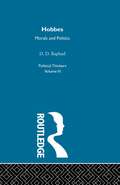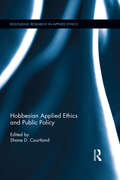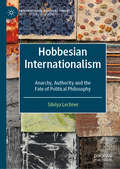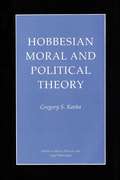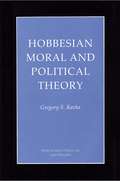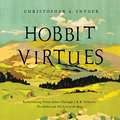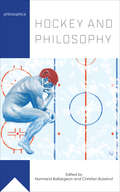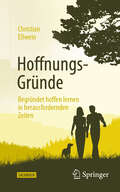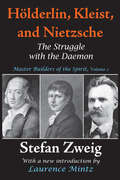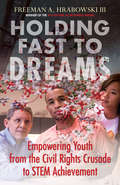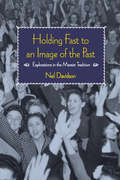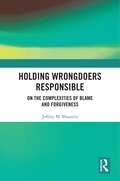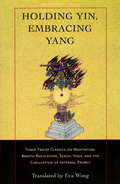- Table View
- List View
Hobbes and the Law of Nature
by Perez ZagorinThis is the first major work in English to explore at length the meaning, context, aims, and vital importance of Thomas Hobbes's concepts of the law of nature and the right of nature. Hobbes remains one of the most challenging and controversial of early modern philosophers, and debates persist about the interpretation of many of his ideas, particularly his views about natural law and natural right. In this book, Perez Zagorin argues that these two concepts are the twin foundations of the entire structure of Hobbes's moral and political thought. Zagorin clears up numerous misconceptions about Hobbes and his relation to earlier natural law thinkers, in particular Hugo Grotius, and he reasserts the often overlooked role of the Hobbesian law of nature as a moral standard from which even sovereign power is not immune. Because Hobbes is commonly thought to be primarily a theorist of sovereignty, political absolutism, and unitary state power, the significance of his moral philosophy is often underestimated and widely assumed to depend entirely on individual self-interest. Zagorin reveals Hobbes's originality as a moral philosopher and his importance as a thinker who subverted and transformed the idea of natural law. Hobbes and the Law of Nature is a major contribution to our understanding of Hobbes's moral, legal, and political philosophy, and a book rich in interpretive and critical insights into Hobbes's writing and thought.
Hobbes and the Social Contract Tradition
by Jean HamptonThis major study of Hobbes' political philosophy draws on recent developments in game and decision theory to explore whether the thrust of the argument in Leviathan, that it is in the interests of the people to create a ruler with absolute power, can be shown to be cogent. Professor Hampton has written a book of vital importance to political philosophers, political and social scientists, and intellectual historians.
Hobbes and the Two Faces of Ethics
by Arash AbizadehReading Hobbes in light of both the history of ethics and the conceptual apparatus developed in recent work on normativity, this book challenges received interpretations of Hobbes and his historical significance. Arash Abizadeh uncovers the fundamental distinction underwriting Hobbes's ethics: between prudential reasons of the good, articulated via natural laws prescribing the means of self-preservation, and reasons of the right or justice, comprising contractual obligations for which we are accountable to others. He shows how Hobbes's distinction marks a watershed in the transition from the ancient Greek to the modern conception of ethics, and demonstrates the relevance of Hobbes's thought to current debates about normativity, reasons, and responsibility. His book will interest Hobbes scholars, historians of ethics, moral philosophers, and political theorists.
Hobbes on Legal Authority and Political Obligation
by Luciano VeneziaHobbes on Legal Authority and Political Obligation develops a new interpretation of Hobbes's theory of political obligation. According to the account developed in the book, the directives issued by the sovereign as introducing authoritative requirements, so that subjects are morally obligated to obey them.
Hobbes's Creativity
by James J. HamiltonThis book approaches Hobbes's philosophy from a completely new perspective: his creativity. Creativity is the production of something which experts consider to be original, valuable and of high quality. James Hamilton explores Hobbes's creativity by focusing on his development, personality, and motivation in the context of his culture and environment, and on the ways in which he thought creatively, as inferred from his writings. Identification of the ideas which Hobbes drew upon is an important part of the study for two reasons. First, they are necessary to determine which of Hobbes's ideas and theories are original and which are not. Second, analysis of his creativity requires an understanding of the ideas from which he drew. Hamilton concludes that Hobbes became a great philosopher because of his creative virtuosity.
Hobbes's Kingdom of Light: A Study of the Foundations of Modern Political Philosophy
by Devin StaufferWas Hobbes the first great architect of modern political philosophy? Highly critical of the classical tradition in philosophy, particularly Aristotle, Hobbes thought that he had established a new science of morality and politics. Devin Stauffer here delves into Hobbes’s critique of the classical tradition, making this oft-neglected aspect of the philosopher’s thought the basis of a new, comprehensive interpretation of his political philosophy. In Hobbes’s Kingdom of Light, Stauffer argues that Hobbes was engaged in a struggle on multiple fronts against forces, both philosophic and religious, that he thought had long distorted philosophy and destroyed the prospects of a lasting peace in politics. By exploring the twists and turns of Hobbes’s arguments, not only in his famous Leviathan but throughout his corpus, Stauffer uncovers the details of Hobbes’s critique of an older outlook, rooted in classical philosophy and Christian theology, and reveals the complexity of Hobbes’s war against the “Kingdom of Darkness.” He also describes the key features of the new outlook—the “Kingdom of Light”—that Hobbes sought to put in its place. Hobbes’s venture helped to prepare the way for the later emergence of modern liberalism and modern secularism. Hobbes’s Kingdom of Light is a wide-ranging and ambitious exploration of Hobbes’s thought.
Hobbes's On the Citizen: A Critical Guide (Cambridge Critical Guides)
by Robin Douglass Johan OlsthoornThis is the first book-length study in English of Thomas Hobbes's On the Citizen. It aims to show that On the Citizen is a valuable and distinctive philosophical work in its own right, and not merely a stepping-stone toward the more famous Leviathan. The volume comprises twelve original essays, written by leading Hobbes scholars, which explore the most important themes of the text: Hobbes's accounts of human nature, moral motivation, and political obligation; his theories of property, sovereignty, and the state; and, finally, his ideas on the relation between secular and ecclesiastical authority, and the politics behind his religious ideas. Taken together, the essays bring to light many distinctive aspects of Hobbes's thought that are often concealed by the prevailing focus on Leviathan, making for a richer and more nuanced picture of his moral, legal, and political philosophy.
Hobbes, the Scriblerians and the History of Philosophy
by Conal CondrenSatire was core to the work of Thomas Hobbes although his critics also used it as a weapon to ridicule him. Condren uses Hobbes as an example to demonstrate that an examination of the persona is needed to advance our understanding of a writer's philosophy.
Hobbes-Arg Philosophers: Hobbes' Impact On Early Twentieth Century Political Philosophy (Cambridge Companions To Philosophy Ser. #11)
by Tom SorellFirst Published in 1999. Routledge is an imprint of Taylor & Francis, an informa company.
Hobbes: A Biography (The Routledge Philosophers)
by A.P. MartinichThomas Hobbes (1588-1679) was the first great English philosopher and one of the most important theorists of human nature and politics in the history of Western thought. This superlative introduction presents Hobbes' main doctrines and arguments, covering all of Hobbes' philosophy. A.P. Martinich begins with a helpful overview of Hobbes' life and work, setting his ideas against the political and scientific background of seventeenth-century England. He then introduces and assesses, in clear chapters, Hobbes' contributions to fundamental areas of philosophy: epistemology and metaphysics, in particular Hobbes' materialism and determinism and his relation to Descartes ethics and political philosophy, concentrating on Hobbes' most famous work, Leviathan, and the theory of the social contract it advances philosophy of science, logic and language, considering Hobbes' theory of nominalism and his writing on rhetoric and the uses of language; religion, examining Hobbes' analyses of revelation, prophets and miracles. The final chapter considers the legacy of Hobbes' thought and his influence on contemporary philosophy.
Hobbes: A Very Short Introduction
by Richard TuckThomas Hobbes (1588-1679) was the first great English political philosopher, and his book Leviathan was one of the first truly modern works of philosophy. Richard Tuck shows that while Hobbes may indeed have been an atheist, he was far from pessimistic about human nature, nor did he advocate totalitarianism. By locating him against the context of his age, we learn that Hobbes developed a theory of knowledge which rivaled that of Descartes in its importance for the formation of modern philosophy.
Hobbes: Great Thinkers on Modern Life
by Hannah DawsonHe elevated politics to a science and in his quest to find a way for society to achieve peace, Thomas Hobbes provided a secular justification for the state, and laid the foundations for modern sociology in the process. His mighty Leviathan and other works can still provide guidance on navigating society and politics today. Thomas Hobbes was an English philosopher who was roiled by the bloodshed and turmoil of the English Civil War. During this period of ceaseless in-fighting, he wrote his masterpiece, Leviathan, which established the foundation for Western political thought. His work has inspired both hate and awe, as he reveals the darker side of human nature and the value of authority. Though he claims man's nature is inherently competitive and selfish, he also shows us how to utilize these traits to our advantage to flourish, be fearless, and free.
Hobbes: Morals and Politics (Political Thinkers Ser.)
by D D Raphael D. D. RaphaelFirst published in 1977 this book is both expository and critical and concentres on Hobbes' ethical and political theory, but also considering the effect on these of his metaphysics. Updated, with a new preface especially for this re-issue, which brings together recent scholarship on Hobbes, a particular useful feature of the book is the new, critical bibliography.
Hobbesian Applied Ethics and Public Policy (Routledge Research in Applied Ethics)
by Shane D. CourtlandMost philosophers and political scientists readily admit that Thomas Hobbes is a significant figure in the history of political thought. His theory was, arguably, one of the first to provide a justification for political legitimacy from the perspective of each individual subject. Many excellent books and articles have examined the justification and structure of Hobbes’ commonwealth, ethical system, and interpretation of Christianity. What is troubling is that the Hobbesian project has been largely missing in the applied ethics and public policy literature. We often find applications of Kantian deontology, Bentham’s or Mill’s utilitarianism, Rawls’s contractualism, the ethics of care, and various iterations of virtue ethics. Hobbesian accounts are routinely ignored and often derided. This is unfortunate because Hobbes’s project offers a unique perspective. To ignore it, when such a perspective would be fruitful to apply to another set of theoretical questions, is a problem in need of a remedy. This volume seeks to eliminate (or, at the very least, partially fill) this gap in the literature. Not only will this volume appeal to those that are generally familiar with Hobbesian scholarship, it will also appeal to a variety of readers that are largely unfamiliar with Hobbes.
Hobbesian Internationalism: Anarchy, Authority and the Fate of Political Philosophy (International Political Theory)
by Silviya LechnerThis book sets out to re-examine the foundations of Thomas Hobbes’s political philosophy, and to develop a Hobbesian normative theory of international relations. Its central thesis is that two concepts – anarchy and authority – constitute the core of Hobbes's political philosophy whose aim is to justify the state. The Hobbesian state is a type of authority (juridical, public, coercive, and supreme) which emerges under conditions of anarchy ('state of nature'). A state-of-nature argument makes a difference because it justifies authority without appeal to moral obligation. The book shows that the closest analogue of a Hobbesian authority in international relations is Kant's confederation of free states, where states enjoy 'anarchical' (equal) freedom. At present, this crucial form of freedom is being threatened by economic processes of globalisation, and by the resurgence of private authority across state borders.
Hobbesian Moral And Political Theory
by Gregory S. KavkaIn recent years serious attempts have been made to systematize and develop the moral and political themes of great philosophers of the past. Kant, Locke, Marx, and the classical utilitarians all have their current defenders and arc taken seriously as expositors of sound moral and political views. It is the aim of this book to introduce Hobbes into this select group by presenting a plausible moral and political theory inspired by Leviathan. Using the techniques of analytic philosophy and elementary game theory, the author develops a Hobbesian argument that justifies the liberal State and reconciles the rights and interests of rational individuals with their obligations. Hobbes's case against anarchy, based on his notorious claim that life outside the political State would be a "war of all against all," is analyzed in detail, while his endorsement of the absolutist State is traced to certain false hypotheses about political sociology. With these eliminated, Hobbes's principles support a liberal redistributive (or "satisfactory") State and a limited right of revolution. Turning to normative issues, the book explains Hobbes's account of morality based on enlightened self-interest and shows how the Hobbesian version of social contract theory justifies the political obligations of citizens of satisfactory States.
Hobbesian Moral and Political Theory (Studies in Moral, Political, and Legal Philosophy #6)
by Gregory S. KavkaIn recent years serious attempts have been made to systematize and develop the moral and political themes of great philosophers of the past. Kant, Locke, Marx, and the classical utilitarians all have their current defenders and arc taken seriously as expositors of sound moral and political views. It is the aim of this book to introduce Hobbes into this select group by presenting a plausible moral and political theory inspired by Leviathan. Using the techniques of analytic philosophy and elementary game theory, the author develops a Hobbesian argument that justifies the liberal State and reconciles the rights and interests of rational individuals with their obligations.Hobbes's case against anarchy, based on his notorious claim that life outside the political State would be a "war of all against all," is analyzed in detail, while his endorsement of the absolutist State is traced to certain false hypotheses about political sociology. With these eliminated, Hobbes's principles support a liberal redistributive (or "satisfactory") State and a limited right of revolution. Turning to normative issues, the book explains Hobbes's account of morality based on enlightened self-interest and shows how the Hobbesian version of social contract theory justifies the political obligations of citizens of satisfactory States.
Hobbit Virtues: Rediscovering J. R. R. Tolkien's Ethics from The Lord of the Rings
by Christopher A. SnyderA response to our fractured political discourse, Hobbit Virtues speaks to the importance of &“virtue ethics&” by examining the fiction of J. R. R. Tolkien—with particular attention to his hobbits.Tolkien&’s works resonate with so many readers in part because Bilbo, Frodo, Sam, Merry, and Pippin demonstrate Classical, Judeo-Christian, Medieval, and even Hindu and Confucian virtues. Tolkien ennobles the small, the humble, and the marginalized in his Middle-earth writings and presents leaders who are hesitant to exercise power, are courteous, and value wisdom and learning. Each chapter in Hobbit Virtues consists of a wide-ranging discussion of a single virtue, exemplified by a character in Middle-earth, explaining its philosophical or theological roots and how the virtue is still relevant in a modern democracy. It will also include appendices where readers can find passages in Tolkien&’s and Lewis&’s works that discuss virtue ethics, and a glossary of virtues from ancient to modern, East to West. Tolkien&’s readers come from many different religious and secular backgrounds and the pleasure and profundity of Hobbit Virtues is that mutual respect for public virtues is, especially now, necessary for a well-functioning pluralistic society.
Hockey and Philosophy (Philosophica)
by Normand Baillargeon and Christian BoissinotDoes hockey provide a better understanding of the differences between Canadian and Québécois nationalisms? Is there a fundamental relationship between the hockey arena and the political arena? What have we lost as a society in abolishing the tie game? Are salaries in the NHL really that outrageous? Is hockey more art than sport? Should hockey players be banned from using performance-enhancing drugs at all costs? Do goalies suffer from angst? Does our national sport have its own mythology and metaphysics? Do hockey brawls reflect our true human nature more than we would care to admit? And what would it be like if the great philosophers were to face off on the ice? A team of philosophy and hockey buffs go deep with these fascinating questions and many others in this examination of a worshipped sport elevated to something akin to a cult. Accessibly written and peppered with humour, the essays in this book will charm specialists, sports fans, and everyone in between. Whether you’re a fan of Richard, Gretzky, Crosby, Plato, Kant, or Kierkegaard, you’re invited to be a spectator at this very special meeting of minds!
Hoffnungs-Gründe: Begründet hoffen lernen in herausfordernden Zeiten
by Christian EllweinHoffnung in stürmischen Zeiten – Warum wir Grund zur Zuversicht haben Krisen, Kriege, Klimawandel – unsere Welt wirkt oft aus den Fugen geraten. Doch dieses Buch macht Mut: Es zeigt anhand historischer Beispiele, dass solche Umbrüche kein neues Phänomen sind – und dass Menschen in der Geschichte immer wieder Wege gefunden haben, damit umzugehen. Faktenbasiert und inspirierend zeigt der Autor auf, wie Menschen in der Vergangenheit Herausforderungen gemeistert haben – und was wir heute daraus lernen können. Hoffnung ist dabei nicht nur ein Gefühl, sondern eine Kraft, mit der wir aktiv unsere Gegenwart und Zukunft gestalten können. Dieses Buch bietet konkrete Impulse: Wie wir unsere Resilienz stärken, unsere Selbstwirksamkeit entfalten und Hoffnung in Taten verwandeln – im persönlichen Leben ebenso wie in Politik und Wirtschaft. Es lädt dazu ein, nicht zu verzweifeln, sondern zu handeln. Ein inspirierender Begleiter für alle, die sich nach Orientierung sehnen – und bereit sind, selbst Teil der Lösung zu sein. Mit Geleitwort von Herrn Dr. Andreas Krafft, der als Psychologe an der Universität St. Gallen u.a. das „Hoffnungsbarometer&“ verfasst.
Holderlin, Kleist, and Nietzsche: The Struggle with the Daemon
by Stefan ZweigThis is the second volume in a trilogy in which Stefan Zweig builds a composite picture of the European mind through intellectual portraits selected from among its most representative and influential figures. In 'Hoelderlin, Kleist, and Nietzsche', Zweig concentrates on three giants of German literature to portray the artist and thinker as a figure possessed by a powerful inner vision at odds with the materialism and scientific positivism of his time, in this case, the nineteenth century. Zweig's subjects here are respectively a lyric poet, a dramatist and writer of novellas, and a philosopher. Each led an unstable life ending in madness and/or suicide and not until the twentieth century did each make their full impact. Whereas the nineteenth-century novel is socially capacious in terms of subject and audience, the three figures treated here are prophets or forerunners of modernist ideas of alienation and exile. Hoelderlin and Kleist consciously opposed the worldly harmoniousness of Goethe's classicism in favor of a visionary inwardness and dramatisation of the subjective psyche. Nietzsche set himself as a destroyer and rebuilder of philosophy and critic of the degradation of the German spirit through nationalism and militarism. Zweig's choice of subjects reflects a division in his own soul. The image of Goethe recurs here as the ultimate upholder of Zweig's own ideals: scientist and artist, receptive to world culture, supremely rational and prudent. Yet Zweig was aware that Hoelderlin, Kleist, and Nietzsche were more daring explorers of the dangerous and destructive aspects of man that needed to be seen and comprehended in the clarifying light of poetry and philosophy.
Holding Fast to Dreams
by Freeman A. Hrabowski IIIAn education leader relates how his experiences with the civil rights movement led him to develop programs promoting educational success in science and technology for African Americans and others. When Freeman Hrabowski was twelve years old, a civil rights leader visited his Birmingham, Alabama, church and spoke about a children's march for civil rights and opportunity. That leader was the Reverend Martin Luther King Jr., and that march changed Hrabowski's life. Until then, Freeman was a kid who loved school and solving math problems. Although his family had always stressed the importance of education, he never expected that the world might change and that black and white students would one day study together. But hearing King speak changed everything for Hrabowski, who convinced his parents that he needed to answer King's call to stand up for equality. While participating in the famed Children's Crusade, he spent five terrifying nights in jail--during which Freeman became a leader for the younger kids, as he learned about the risk and sacrifice that it would take to fight for justice. Hrabowski went on to fuse his passion for education and for equality, as he made his life's work inspiring high academic achievement among students of all races in science and engineering. It also brought him from Birmingham to Baltimore, where he has been president of the University of Maryland, Baltimore County for more than two decades. While at UMBC, he co-founded the Meyerhoff Scholars Program, which has been one of the most successful programs for educating African Americans who go on to earn doctorates in the STEM disciplines. In Holding Fast to Dreams, Hrabowski recounts his journey as an educator, a university president, and a pioneer in developing successful, holistic programs for high-achieving students of all races.From the Hardcover edition.
Holding Fast to an Image of the Past
by Neil DavidsonDavidson explores classic themes in historical materialism as he explains: the moments of transition from the dominance of one mode of production to another; the process of social revolution which accompany these transitions; and the problem of nationalism, both as a theoretical challenge to Marxism's capacity for historical explanation and as a practical obstacle to socialist consciousness.
Holding Wrongdoers Responsible: On the Complexities of Blame and Forgiveness
by Jeffrey M BlusteinHolding Wrongdoers Responsible contests a number of widely accepted claims about blame and forgiveness that are insufficiently examined in the philosophical literature, and their relationship to each other. These claims are: i Anger is the most fitting kind of blame for those who are guilty of wrongdoing.ii Culpable wrongdoers should be blamed for what they have done.iii Forgiving consists of renouncing blame and blame feelings, especially angry ones.iv Forgiving is a kind and compassionate act for which a wrongdoer should be grateful. Against (i), the book argues that there are a number of reasons why we should be skeptical about the singular importance given to anger in this connection; against (ii), that blame is just one possible response to wrongdoing and, like other responses, has to be evaluated in relation to its purposes and the available alternatives; against (iii), that the continuation of blame after forgiveness is neither conceptually nor morally ruled out; and against (iv), that the image of forgiveness as benevolent and gift-like belies its dark side. By contesting these claims, the book reveals some of the moral and psychological complexities of these phenomena.
Holding Yin, Embracing Yang: Three Taoist Classics on Meditation, Breath Regulation, Sexual Yoga, and the Cir culation of Internal Energy
by Eva WongIn Holding Yin, Embracing Yang, Eva Wong presents translations of three key texts containing the highest teachings of the Eastern and Western schools of Taoist internal alchemy--the discipline of cultivating health, longevity, and immortality by transforming the energetic structures of body and mind. The texts are primarily concerned with meditation, breathing practices, and sexual yoga with a partner--all as means for developing within ourselves the same life-giving energy that sustains and nourishes the universe. The texts in this collection offer a clear view of the physical, mental, and spiritual methods of Taoist practice, showing why they are important and how these methods all can work together in the cultivation of mental peace, radiant health, and longevity. This collection will provide inspiration and the essential foundation necessary to begin Taoist practice under the guidance of a teacher. The three classics translated here are: Treatise on the Mysterious Orifice by Xuanweilun (sixteenth century), Discussion on the Cavity of the Tao by Daojiaotan (nineteenth century), and Secret Teachings on the Three Wheels by Sanjubizhi (nineteenth century). Included is an introduction in which Wong discusses the various schools of internal alchemy, as well as their main practices.
